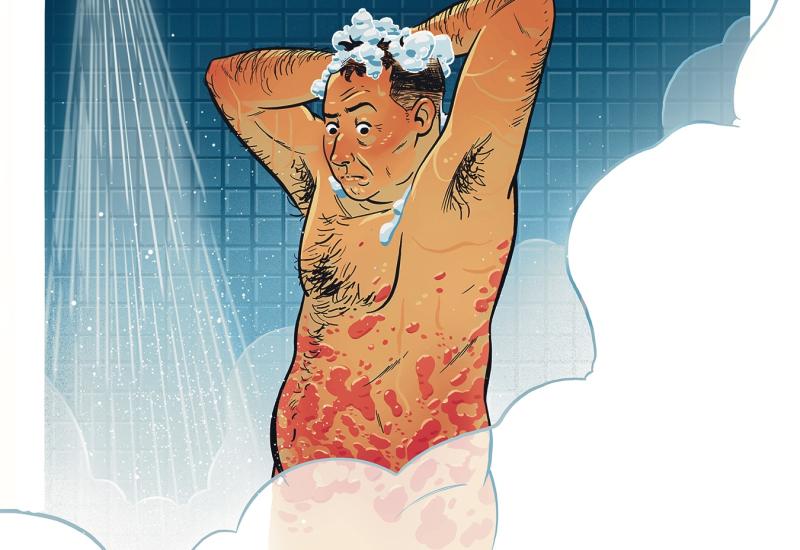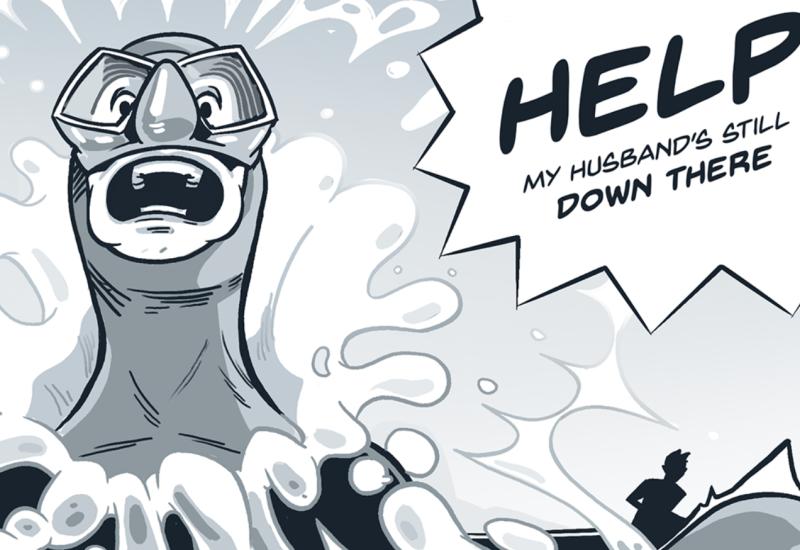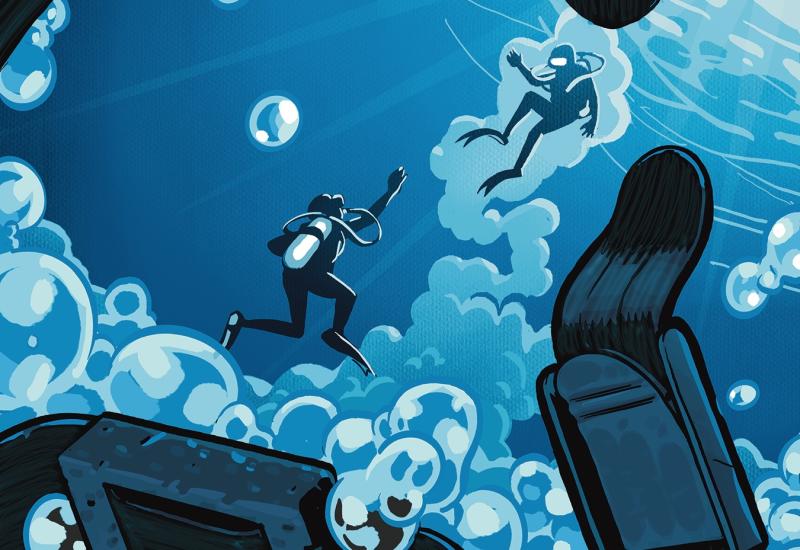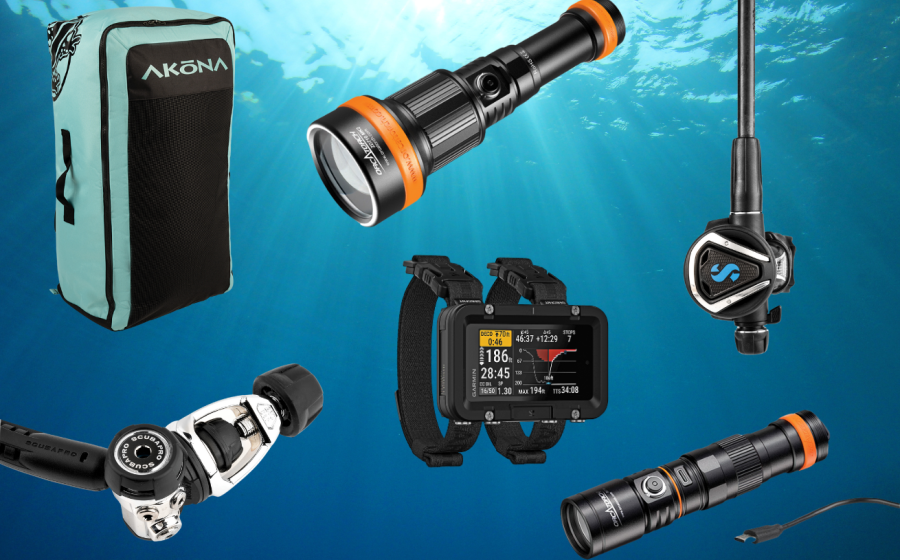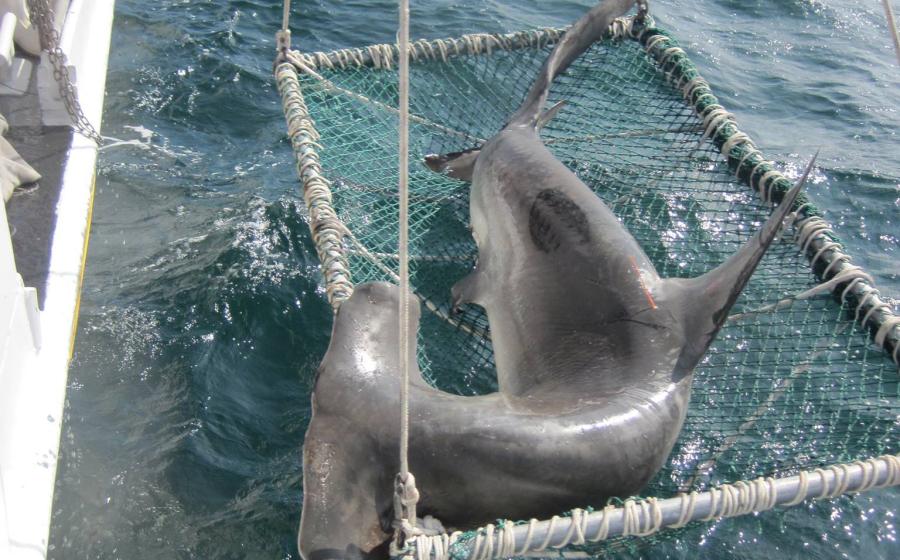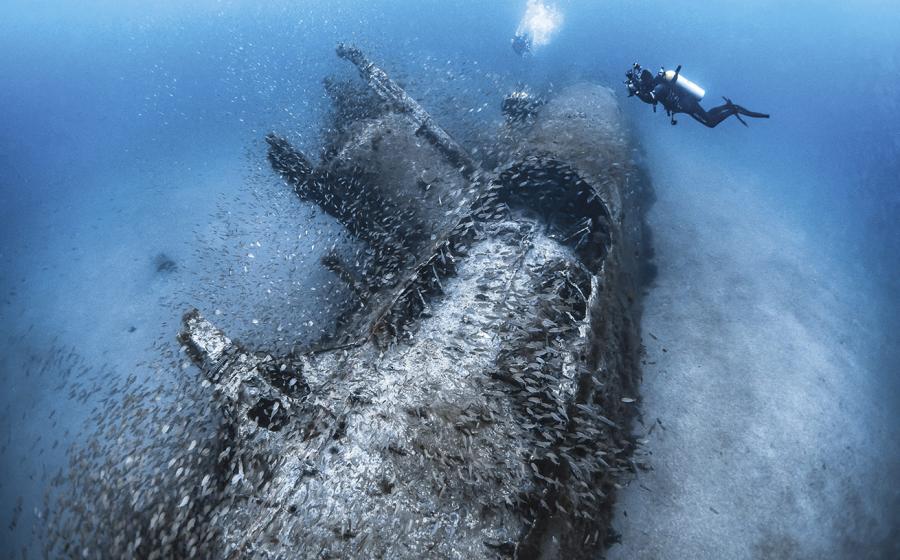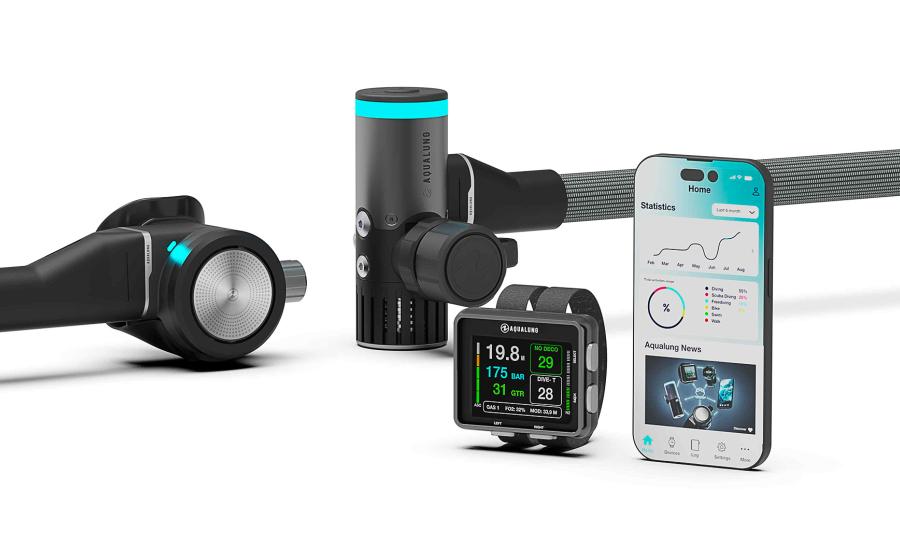Lessons for Life: Save your eardrum

Eardrum injury
Michael Morgenstern
Diane was struggling. She just couldn’t shake the nagging feeling in her ear. It hurt, but no matter how hard she tried, she couldn’t clear it. Still, she really wanted to see the helicopter at the bottom of the quarry. It had just been placed, and she wanted to be among the first to have her photograph taken at the controls. She inverted to a head-down position and began swimming to get there quickly. The pain grew worse. And then it was gone. She stopped for a moment and shook her head. Everything seemed to have returned to normal. She felt relieved, physically and personally. Everything went great for the rest of the dive.
THE DIVER
Diane was a moderately experienced diver. She dived whenever she could get in the water, five or six times a year. She took vacations to dive locations every year, but most of her diving took place in the local quarry. In her mid-30s, she had made approximately 200 dives over the past four years. She was in average shape and had no health problems.
THE DIVE
This weekend’s special dive at the quarry was to celebrate the new helicopter. Diane had been planning to make the dive for weeks. The only thing that could have gotten in the way was her head cold. She took cold medicine, and her symptoms had mostly cleared by Friday. She planned to take medicine Saturday morning -- maybe an extra dose -- and make the dives.
A crowd had gathered at the dive site; each diver was assigned a time to visit the helicopter. Diane’s time was at 11 a.m., so she decided to make a first dive that morning in another part of the quarry to pass the time. With her buddy she spent about a half an hour cruising submerged boats and attractions in the man-made lake before returning to a picnic table to warm up and wait for their appointed time.
After her first dive, Diane thought she had water in her left ear that just wouldn’t come out. She put drops in her ear and tried shaking her head, but nothing seemed to clear the feeling of fullness. It did lighten up some as the time passed, and she thought her ear had finally dried out.
THE ACCIDENT
The second dive of the day began as she expected. The schedule had slipped a little bit, so it was closer to 11:30 as she began her descent. The helicopter rested on the quarry bottom at around 45 feet. As Diane passed 20 feet, she could see the structure rising up from the bottom. The visibility wasn’t great — too many other divers had been down before them. Still, she wasn’t looking for a photograph of the entire helicopter. She wanted a picture of herself seated at the controls to post on Facebook, so visibility was less important. Her buddy would be close to her.
As she descended, Diane felt pressure in her left ear as though she hadn’t cleared her ears at all, even though she knew she had. Her right ear felt fine. When she flipped to a head-down position to swim more quickly to the bottom, the pain got worse. Just as she was about to stop, feeling the pain was too much, everything cleared up. She was dizzy for a minute, but when her buddy asked if she was OK she signaled yes, and they made their way to the cockpit. Her ear was fine for the rest of the dive.
A few hours later, after she had posted her photos, Diane was relaxing at home. But her ear was bothering her. She couldn’t hear very well, and it was starting to hurt. As the evening progressed, so did the pain. By 6 p.m., she couldn’t stand it any longer. She went to the emergency room, where the doctor discovered she had perforated her eardrum and had the beginnings of a severe infection.
ANALYSIS
Middle-ear barotrauma is the most common injury divers suffer. Most divers face this problem at some time in their diving careers, although hopefully the situation isn’t as severe as Diane’s.
Often it is caused by a lack of understanding of the anatomy of the ear. Divers often complain of having “water in their ears” and take eardrops to clear them. While this is certainly a possibility, if the eardrops don’t clear the feeling of fullness, the blockage is probably in the middle ear, rather than the outer ear.
If the Eustachian tubes are blocked or even partially obstructed during a dive, such as by cold symptoms, it can be impossible to equalize. As pressure builds on the body, the Eustachian tubes collapse, making it impossible to equalize the middle ear to the external pressure on the eardrum. When this happens, the body will attempt equalize the pressure by releasing plasma or blood into the middle ear. This causes the feeling of fullness divers occasionally feel.
In Diane’s case, she had some residual fullness from her first dive — probably from fluid in the middle ear. It eased up as the pressures equalized and she rested. The second dive made the problem that much worse. Additionally, the medication she took that morning had worn off by the time she began her second dive.
Often, it can take as long as two weeks for additional mucous and swelling in the mucous membranes to return to normal following a severe head cold, even after the symptoms are gone.
Diane’s eardrum perforated on the second dive when the body could no longer adjust to the imbalance of pressure. That perforation allowed fresh water from the quarry to enter her middle ear, causing the dizziness and infection. The use of antibiotics cleared the infection, and her eardrum eventually healed. She returned to diving two months later.
LESSONS FOR LIFE
• Pay attention to your ears. Do not attempt to force a descent if you feel pain. Ascend to relieve pressure. If you can’t equalize, abort the dive.
• Be cautious when taking medications before a dive. All official recommendations state not to take sinus medications, but many divers do. If you make the choice to use sinus medications to aid equalization, make sure they will continue to be effective throughout the course of your diving day.
• Equalize early and often on every dive. Pay close attention to your ears. If you have trouble clearing your ears, learn additional clearing techniques that aid the process.
Eric Douglas co-authored the book Scuba Diving Safety and has written a series of dive adventure novels and short stories as well. Check out his website at www.booksbyeric.com
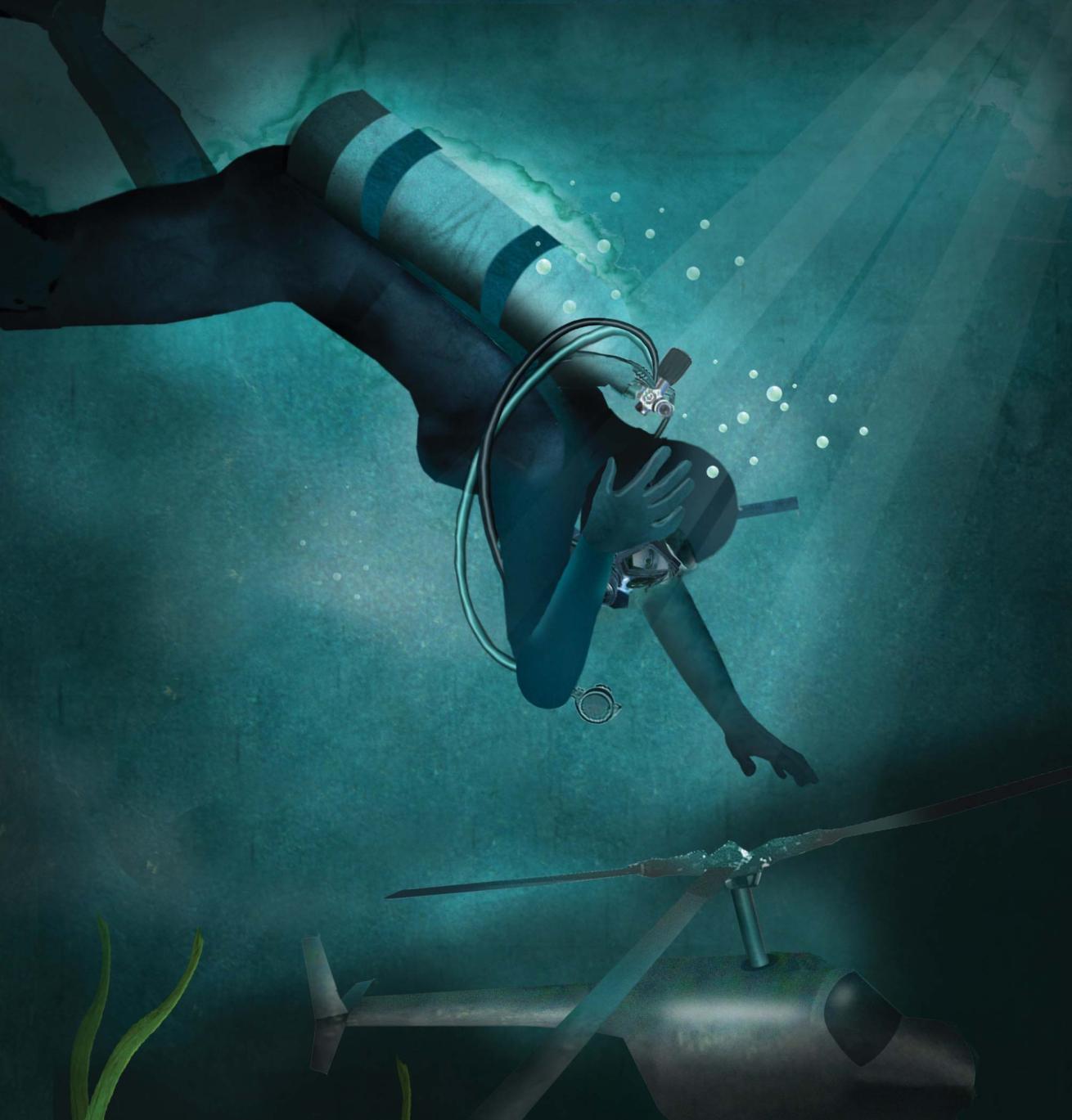
Michael MorgensternNagging eardrum issues trouble a diver in this edition of Lessons for Life.
Diane was struggling. She just couldn’t shake the nagging feeling in her ear. It hurt, but no matter how hard she tried, she couldn’t clear it. Still, she really wanted to see the helicopter at the bottom of the quarry. It had just been placed, and she wanted to be among the first to have her photograph taken at the controls. She inverted to a head-down position and began swimming to get there quickly. The pain grew worse. And then it was gone. She stopped for a moment and shook her head. Everything seemed to have returned to normal. She felt relieved, physically and personally. Everything went great for the rest of the dive.
THE DIVER
Diane was a moderately experienced diver. She dived whenever she could get in the water, five or six times a year. She took vacations to dive locations every year, but most of her diving took place in the local quarry. In her mid-30s, she had made approximately 200 dives over the past four years. She was in average shape and had no health problems.
THE DIVE
This weekend’s special dive at the quarry was to celebrate the new helicopter. Diane had been planning to make the dive for weeks. The only thing that could have gotten in the way was her head cold. She took cold medicine, and her symptoms had mostly cleared by Friday. She planned to take medicine Saturday morning -- maybe an extra dose -- and make the dives.
A crowd had gathered at the dive site; each diver was assigned a time to visit the helicopter. Diane’s time was at 11 a.m., so she decided to make a first dive that morning in another part of the quarry to pass the time. With her buddy she spent about a half an hour cruising submerged boats and attractions in the man-made lake before returning to a picnic table to warm up and wait for their appointed time.
After her first dive, Diane thought she had water in her left ear that just wouldn’t come out. She put drops in her ear and tried shaking her head, but nothing seemed to clear the feeling of fullness. It did lighten up some as the time passed, and she thought her ear had finally dried out.
THE ACCIDENT
The second dive of the day began as she expected. The schedule had slipped a little bit, so it was closer to 11:30 as she began her descent. The helicopter rested on the quarry bottom at around 45 feet. As Diane passed 20 feet, she could see the structure rising up from the bottom. The visibility wasn’t great — too many other divers had been down before them. Still, she wasn’t looking for a photograph of the entire helicopter. She wanted a picture of herself seated at the controls to post on Facebook, so visibility was less important. Her buddy would be close to her.
As she descended, Diane felt pressure in her left ear as though she hadn’t cleared her ears at all, even though she knew she had. Her right ear felt fine. When she flipped to a head-down position to swim more quickly to the bottom, the pain got worse. Just as she was about to stop, feeling the pain was too much, everything cleared up. She was dizzy for a minute, but when her buddy asked if she was OK she signaled yes, and they made their way to the cockpit. Her ear was fine for the rest of the dive.
A few hours later, after she had posted her photos, Diane was relaxing at home. But her ear was bothering her. She couldn’t hear very well, and it was starting to hurt. As the evening progressed, so did the pain. By 6 p.m., she couldn’t stand it any longer. She went to the emergency room, where the doctor discovered she had perforated her eardrum and had the beginnings of a severe infection.
ANALYSIS
Middle-ear barotrauma is the most common injury divers suffer. Most divers face this problem at some time in their diving careers, although hopefully the situation isn’t as severe as Diane’s.
Often it is caused by a lack of understanding of the anatomy of the ear. Divers often complain of having “water in their ears” and take eardrops to clear them. While this is certainly a possibility, if the eardrops don’t clear the feeling of fullness, the blockage is probably in the middle ear, rather than the outer ear.
If the Eustachian tubes are blocked or even partially obstructed during a dive, such as by cold symptoms, it can be impossible to equalize. As pressure builds on the body, the Eustachian tubes collapse, making it impossible to equalize the middle ear to the external pressure on the eardrum. When this happens, the body will attempt equalize the pressure by releasing plasma or blood into the middle ear. This causes the feeling of fullness divers occasionally feel.
In Diane’s case, she had some residual fullness from her first dive — probably from fluid in the middle ear. It eased up as the pressures equalized and she rested. The second dive made the problem that much worse. Additionally, the medication she took that morning had worn off by the time she began her second dive.
Often, it can take as long as two weeks for additional mucous and swelling in the mucous membranes to return to normal following a severe head cold, even after the symptoms are gone.
Diane’s eardrum perforated on the second dive when the body could no longer adjust to the imbalance of pressure. That perforation allowed fresh water from the quarry to enter her middle ear, causing the dizziness and infection. The use of antibiotics cleared the infection, and her eardrum eventually healed. She returned to diving two months later.
LESSONS FOR LIFE
• Pay attention to your ears. Do not attempt to force a descent if you feel pain. Ascend to relieve pressure. If you can’t equalize, abort the dive.
• Be cautious when taking medications before a dive. All official recommendations state not to take sinus medications, but many divers do. If you make the choice to use sinus medications to aid equalization, make sure they will continue to be effective throughout the course of your diving day.
• Equalize early and often on every dive. Pay close attention to your ears. If you have trouble clearing your ears, learn additional clearing techniques that aid the process.
About Lessons for Life
We're often asked if the Lessons for Life columns are based on real-life events. The answer is yes, they are. The names and locations have been removed or altered to protect identities, but these stories are meant to teach you who to handle a scuba diving emergency by learning from the mistakes other divers have made. Author Eric Douglas takes creative license on occasion for the story, but the events and, often, the communication between divers before the accident are entirely based on incident reports.
Eric Douglas co-authored the book Scuba Diving Safety and has written a series of dive adventure novels and short stories as well. Check out his website at www.booksbyeric.com

